Entrepreneurship: Ventures, Impact of Businesses, and Traits Report
VerifiedAdded on 2020/12/30
|19
|5351
|134
Report
AI Summary
This report provides a comprehensive overview of entrepreneurship, examining various types of entrepreneurial ventures including micro, small, medium, and large businesses, as well as different typologies like social, scalable, serial, and lifestyle entrepreneurship. The report analyzes the similarities and differences between these ventures, highlighting their distinct characteristics and operational scales. Furthermore, it interprets mini-research on the impact of micro and small businesses on the economy, providing statistical data on their contribution to employment and turnover. The report also discusses the contribution of small businesses and start-ups to the growth of the social economy after Brexit. Additionally, it assesses the characteristics, traits, and skills of successful entrepreneurs and explores how aspects of entrepreneurial personality reflect motivation and mindset. Finally, it examines how background and experience can either hinder or foster entrepreneurship, providing a well-rounded perspective on the subject.

ENTREPRENEURSHIP
Paraphrase This Document
Need a fresh take? Get an instant paraphrase of this document with our AI Paraphraser
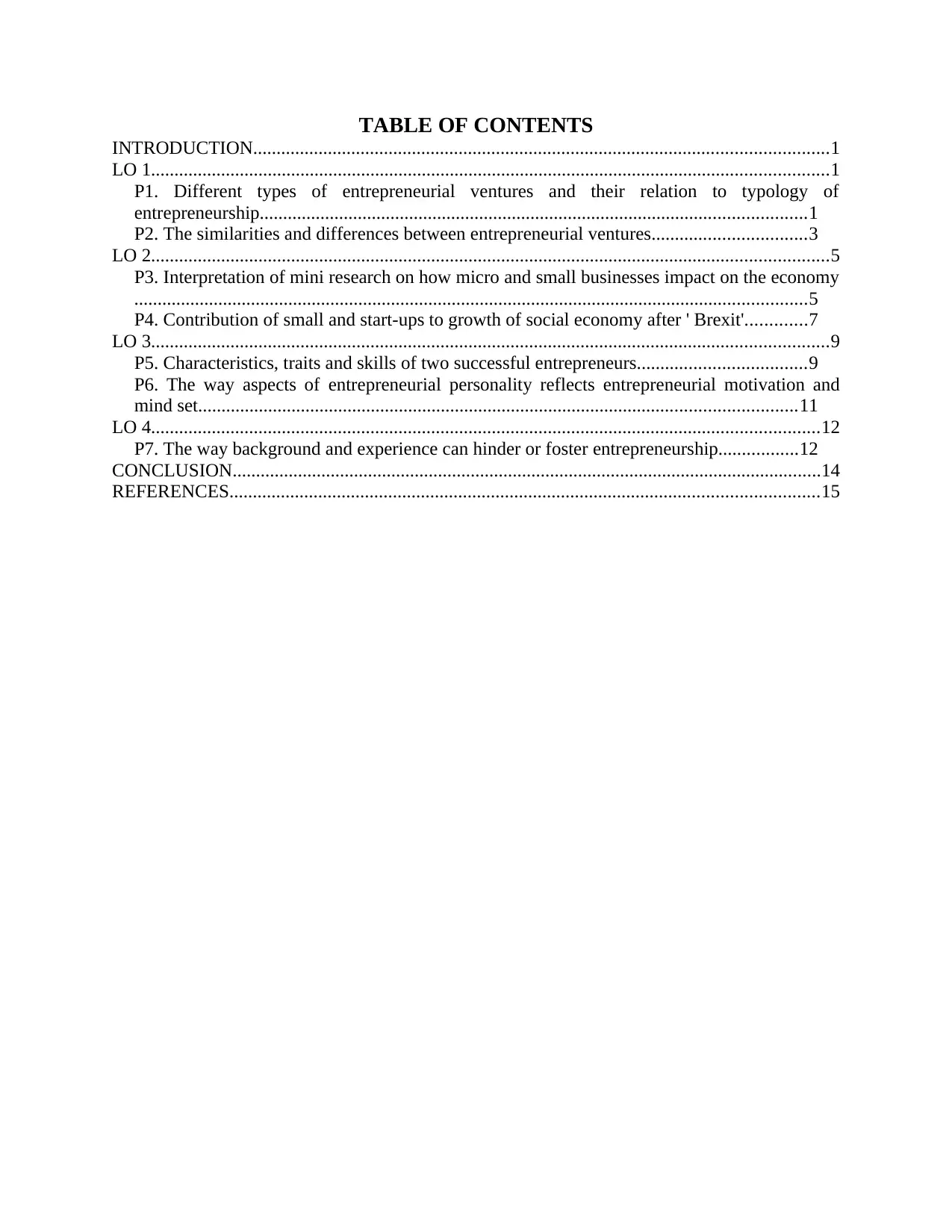
TABLE OF CONTENTS
INTRODUCTION...........................................................................................................................1
LO 1.................................................................................................................................................1
P1. Different types of entrepreneurial ventures and their relation to typology of
entrepreneurship.....................................................................................................................1
P2. The similarities and differences between entrepreneurial ventures.................................3
LO 2.................................................................................................................................................5
P3. Interpretation of mini research on how micro and small businesses impact on the economy
................................................................................................................................................5
P4. Contribution of small and start-ups to growth of social economy after ' Brexit'.............7
LO 3.................................................................................................................................................9
P5. Characteristics, traits and skills of two successful entrepreneurs....................................9
P6. The way aspects of entrepreneurial personality reflects entrepreneurial motivation and
mind set................................................................................................................................11
LO 4...............................................................................................................................................12
P7. The way background and experience can hinder or foster entrepreneurship.................12
CONCLUSION..............................................................................................................................14
REFERENCES..............................................................................................................................15
INTRODUCTION...........................................................................................................................1
LO 1.................................................................................................................................................1
P1. Different types of entrepreneurial ventures and their relation to typology of
entrepreneurship.....................................................................................................................1
P2. The similarities and differences between entrepreneurial ventures.................................3
LO 2.................................................................................................................................................5
P3. Interpretation of mini research on how micro and small businesses impact on the economy
................................................................................................................................................5
P4. Contribution of small and start-ups to growth of social economy after ' Brexit'.............7
LO 3.................................................................................................................................................9
P5. Characteristics, traits and skills of two successful entrepreneurs....................................9
P6. The way aspects of entrepreneurial personality reflects entrepreneurial motivation and
mind set................................................................................................................................11
LO 4...............................................................................................................................................12
P7. The way background and experience can hinder or foster entrepreneurship.................12
CONCLUSION..............................................................................................................................14
REFERENCES..............................................................................................................................15
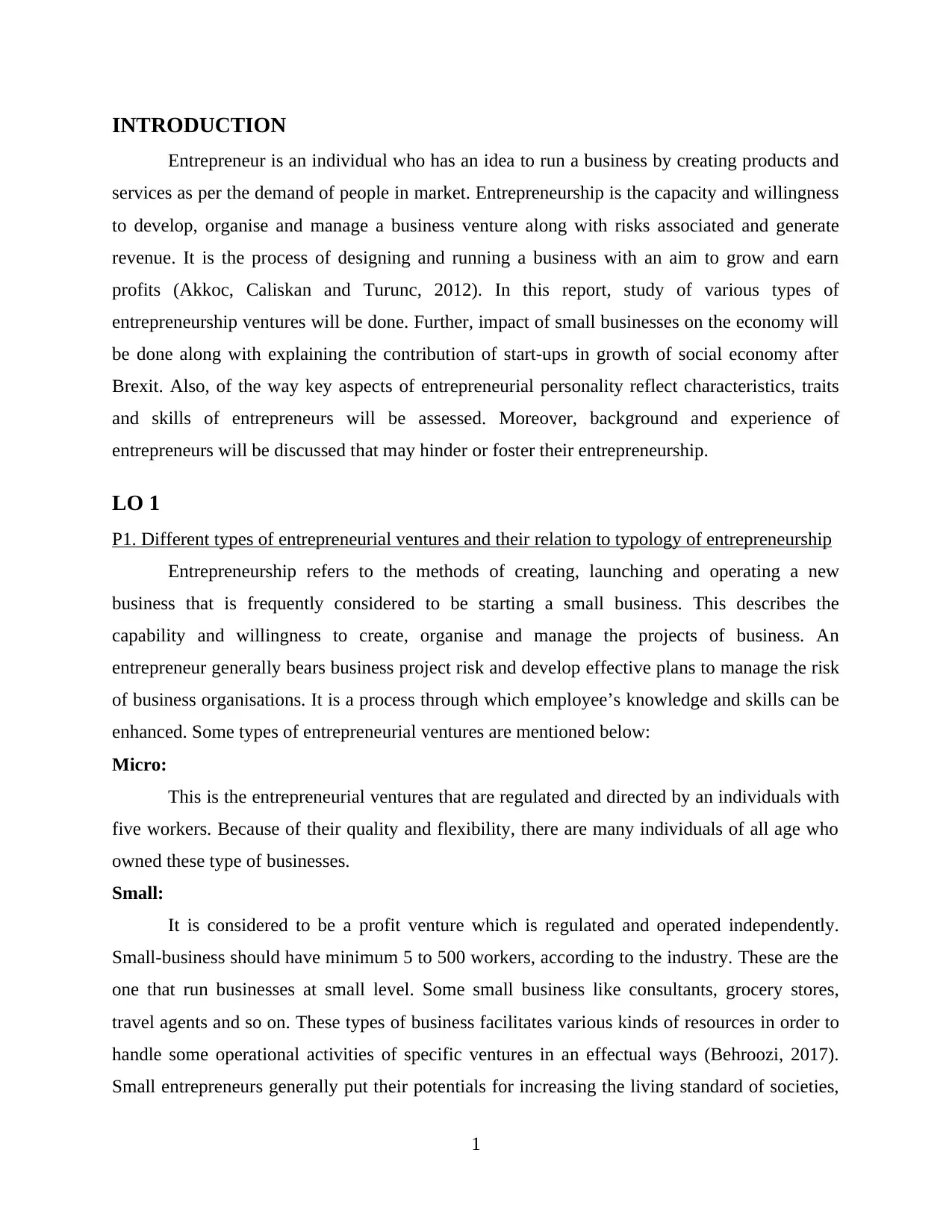
INTRODUCTION
Entrepreneur is an individual who has an idea to run a business by creating products and
services as per the demand of people in market. Entrepreneurship is the capacity and willingness
to develop, organise and manage a business venture along with risks associated and generate
revenue. It is the process of designing and running a business with an aim to grow and earn
profits (Akkoc, Caliskan and Turunc, 2012). In this report, study of various types of
entrepreneurship ventures will be done. Further, impact of small businesses on the economy will
be done along with explaining the contribution of start-ups in growth of social economy after
Brexit. Also, of the way key aspects of entrepreneurial personality reflect characteristics, traits
and skills of entrepreneurs will be assessed. Moreover, background and experience of
entrepreneurs will be discussed that may hinder or foster their entrepreneurship.
LO 1
P1. Different types of entrepreneurial ventures and their relation to typology of entrepreneurship
Entrepreneurship refers to the methods of creating, launching and operating a new
business that is frequently considered to be starting a small business. This describes the
capability and willingness to create, organise and manage the projects of business. An
entrepreneur generally bears business project risk and develop effective plans to manage the risk
of business organisations. It is a process through which employee’s knowledge and skills can be
enhanced. Some types of entrepreneurial ventures are mentioned below:
Micro:
This is the entrepreneurial ventures that are regulated and directed by an individuals with
five workers. Because of their quality and flexibility, there are many individuals of all age who
owned these type of businesses.
Small:
It is considered to be a profit venture which is regulated and operated independently.
Small-business should have minimum 5 to 500 workers, according to the industry. These are the
one that run businesses at small level. Some small business like consultants, grocery stores,
travel agents and so on. These types of business facilitates various kinds of resources in order to
handle some operational activities of specific ventures in an effectual ways (Behroozi, 2017).
Small entrepreneurs generally put their potentials for increasing the living standard of societies,
1
Entrepreneur is an individual who has an idea to run a business by creating products and
services as per the demand of people in market. Entrepreneurship is the capacity and willingness
to develop, organise and manage a business venture along with risks associated and generate
revenue. It is the process of designing and running a business with an aim to grow and earn
profits (Akkoc, Caliskan and Turunc, 2012). In this report, study of various types of
entrepreneurship ventures will be done. Further, impact of small businesses on the economy will
be done along with explaining the contribution of start-ups in growth of social economy after
Brexit. Also, of the way key aspects of entrepreneurial personality reflect characteristics, traits
and skills of entrepreneurs will be assessed. Moreover, background and experience of
entrepreneurs will be discussed that may hinder or foster their entrepreneurship.
LO 1
P1. Different types of entrepreneurial ventures and their relation to typology of entrepreneurship
Entrepreneurship refers to the methods of creating, launching and operating a new
business that is frequently considered to be starting a small business. This describes the
capability and willingness to create, organise and manage the projects of business. An
entrepreneur generally bears business project risk and develop effective plans to manage the risk
of business organisations. It is a process through which employee’s knowledge and skills can be
enhanced. Some types of entrepreneurial ventures are mentioned below:
Micro:
This is the entrepreneurial ventures that are regulated and directed by an individuals with
five workers. Because of their quality and flexibility, there are many individuals of all age who
owned these type of businesses.
Small:
It is considered to be a profit venture which is regulated and operated independently.
Small-business should have minimum 5 to 500 workers, according to the industry. These are the
one that run businesses at small level. Some small business like consultants, grocery stores,
travel agents and so on. These types of business facilitates various kinds of resources in order to
handle some operational activities of specific ventures in an effectual ways (Behroozi, 2017).
Small entrepreneurs generally put their potentials for increasing the living standard of societies,
1
⊘ This is a preview!⊘
Do you want full access?
Subscribe today to unlock all pages.

Trusted by 1+ million students worldwide
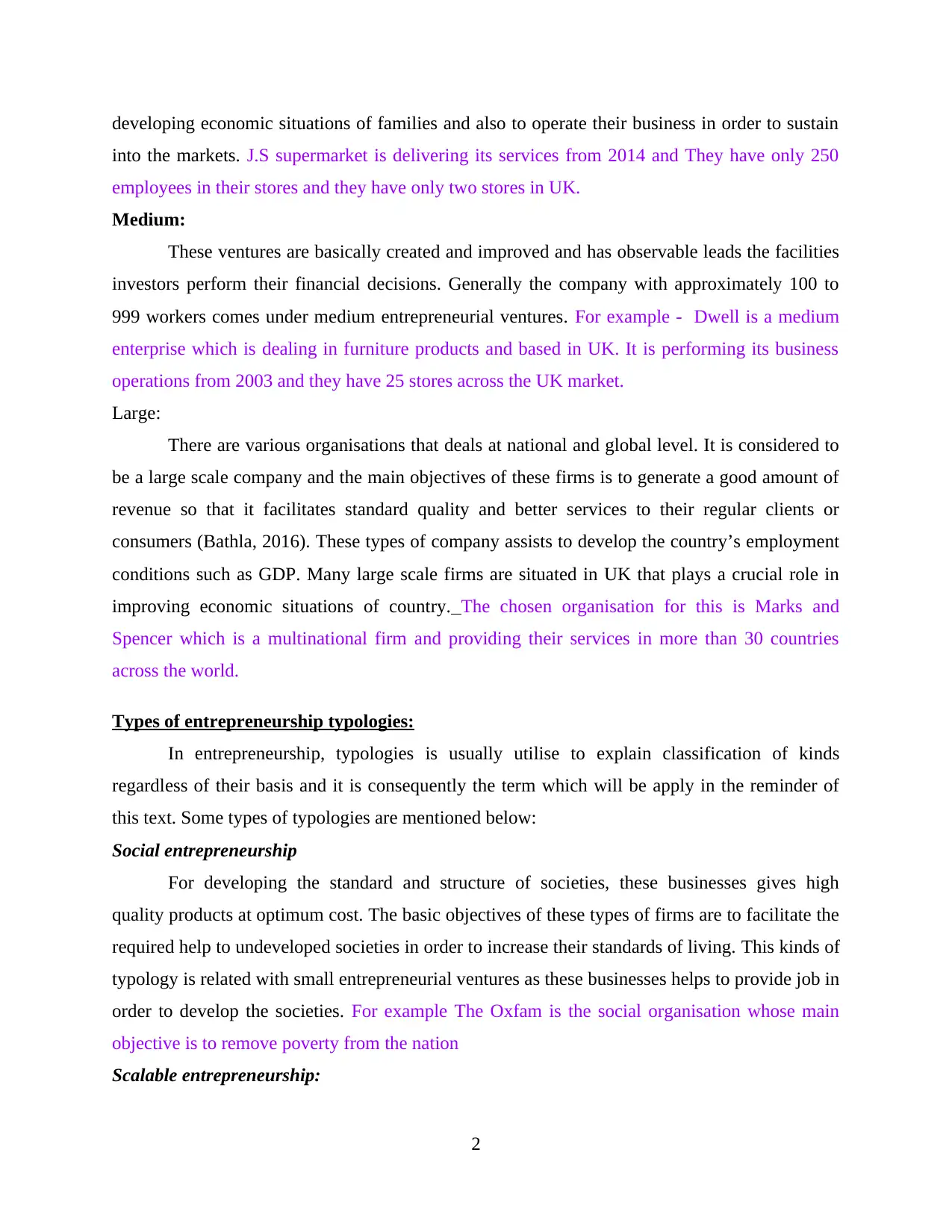
developing economic situations of families and also to operate their business in order to sustain
into the markets. J.S supermarket is delivering its services from 2014 and They have only 250
employees in their stores and they have only two stores in UK.
Medium:
These ventures are basically created and improved and has observable leads the facilities
investors perform their financial decisions. Generally the company with approximately 100 to
999 workers comes under medium entrepreneurial ventures. For example - Dwell is a medium
enterprise which is dealing in furniture products and based in UK. It is performing its business
operations from 2003 and they have 25 stores across the UK market.
Large:
There are various organisations that deals at national and global level. It is considered to
be a large scale company and the main objectives of these firms is to generate a good amount of
revenue so that it facilitates standard quality and better services to their regular clients or
consumers (Bathla, 2016). These types of company assists to develop the country’s employment
conditions such as GDP. Many large scale firms are situated in UK that plays a crucial role in
improving economic situations of country. The chosen organisation for this is Marks and
Spencer which is a multinational firm and providing their services in more than 30 countries
across the world.
Types of entrepreneurship typologies:
In entrepreneurship, typologies is usually utilise to explain classification of kinds
regardless of their basis and it is consequently the term which will be apply in the reminder of
this text. Some types of typologies are mentioned below:
Social entrepreneurship
For developing the standard and structure of societies, these businesses gives high
quality products at optimum cost. The basic objectives of these types of firms are to facilitate the
required help to undeveloped societies in order to increase their standards of living. This kinds of
typology is related with small entrepreneurial ventures as these businesses helps to provide job in
order to develop the societies. For example The Oxfam is the social organisation whose main
objective is to remove poverty from the nation
Scalable entrepreneurship:
2
into the markets. J.S supermarket is delivering its services from 2014 and They have only 250
employees in their stores and they have only two stores in UK.
Medium:
These ventures are basically created and improved and has observable leads the facilities
investors perform their financial decisions. Generally the company with approximately 100 to
999 workers comes under medium entrepreneurial ventures. For example - Dwell is a medium
enterprise which is dealing in furniture products and based in UK. It is performing its business
operations from 2003 and they have 25 stores across the UK market.
Large:
There are various organisations that deals at national and global level. It is considered to
be a large scale company and the main objectives of these firms is to generate a good amount of
revenue so that it facilitates standard quality and better services to their regular clients or
consumers (Bathla, 2016). These types of company assists to develop the country’s employment
conditions such as GDP. Many large scale firms are situated in UK that plays a crucial role in
improving economic situations of country. The chosen organisation for this is Marks and
Spencer which is a multinational firm and providing their services in more than 30 countries
across the world.
Types of entrepreneurship typologies:
In entrepreneurship, typologies is usually utilise to explain classification of kinds
regardless of their basis and it is consequently the term which will be apply in the reminder of
this text. Some types of typologies are mentioned below:
Social entrepreneurship
For developing the standard and structure of societies, these businesses gives high
quality products at optimum cost. The basic objectives of these types of firms are to facilitate the
required help to undeveloped societies in order to increase their standards of living. This kinds of
typology is related with small entrepreneurial ventures as these businesses helps to provide job in
order to develop the societies. For example The Oxfam is the social organisation whose main
objective is to remove poverty from the nation
Scalable entrepreneurship:
2
Paraphrase This Document
Need a fresh take? Get an instant paraphrase of this document with our AI Paraphraser
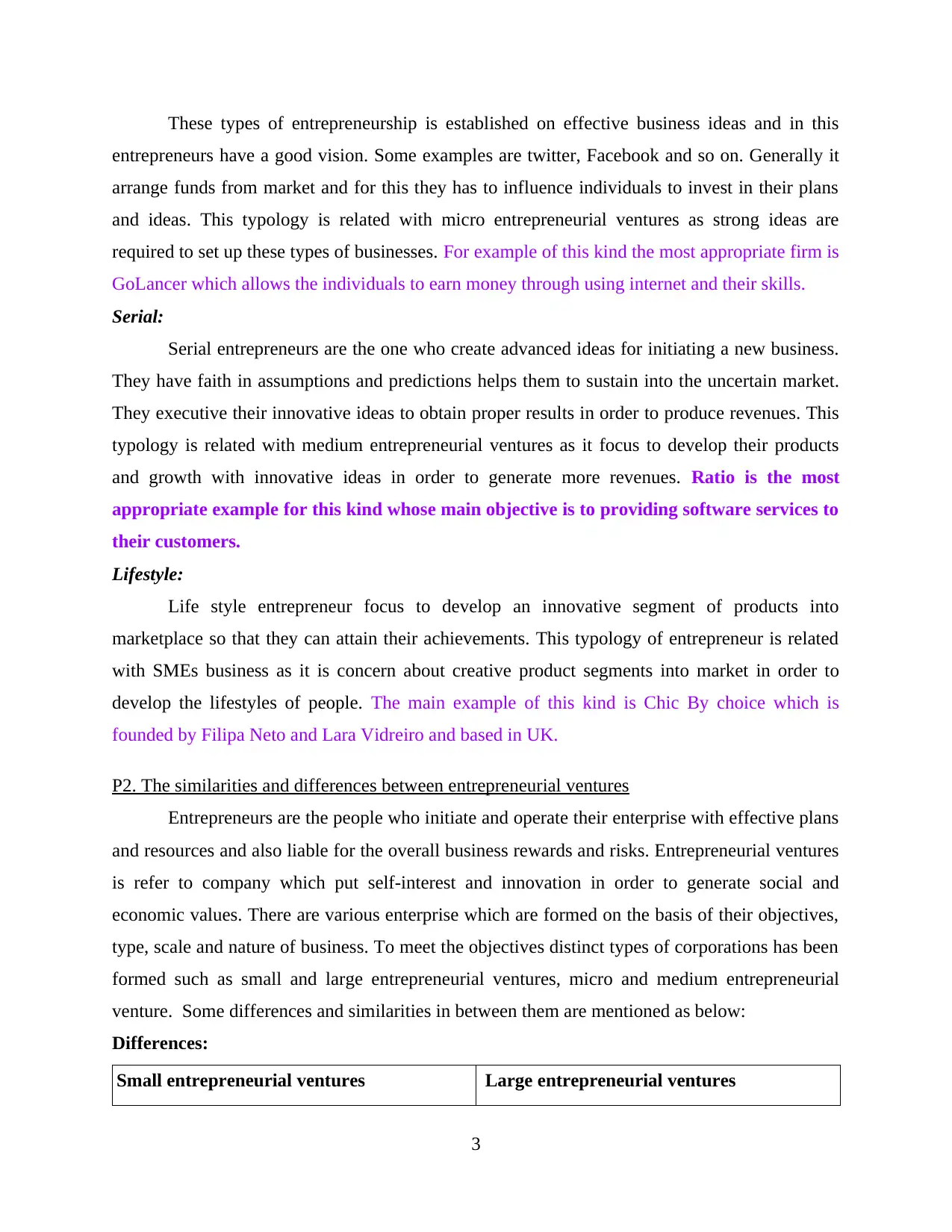
These types of entrepreneurship is established on effective business ideas and in this
entrepreneurs have a good vision. Some examples are twitter, Facebook and so on. Generally it
arrange funds from market and for this they has to influence individuals to invest in their plans
and ideas. This typology is related with micro entrepreneurial ventures as strong ideas are
required to set up these types of businesses. For example of this kind the most appropriate firm is
GoLancer which allows the individuals to earn money through using internet and their skills.
Serial:
Serial entrepreneurs are the one who create advanced ideas for initiating a new business.
They have faith in assumptions and predictions helps them to sustain into the uncertain market.
They executive their innovative ideas to obtain proper results in order to produce revenues. This
typology is related with medium entrepreneurial ventures as it focus to develop their products
and growth with innovative ideas in order to generate more revenues. Ratio is the most
appropriate example for this kind whose main objective is to providing software services to
their customers.
Lifestyle:
Life style entrepreneur focus to develop an innovative segment of products into
marketplace so that they can attain their achievements. This typology of entrepreneur is related
with SMEs business as it is concern about creative product segments into market in order to
develop the lifestyles of people. The main example of this kind is Chic By choice which is
founded by Filipa Neto and Lara Vidreiro and based in UK.
P2. The similarities and differences between entrepreneurial ventures
Entrepreneurs are the people who initiate and operate their enterprise with effective plans
and resources and also liable for the overall business rewards and risks. Entrepreneurial ventures
is refer to company which put self-interest and innovation in order to generate social and
economic values. There are various enterprise which are formed on the basis of their objectives,
type, scale and nature of business. To meet the objectives distinct types of corporations has been
formed such as small and large entrepreneurial ventures, micro and medium entrepreneurial
venture. Some differences and similarities in between them are mentioned as below:
Differences:
Small entrepreneurial ventures Large entrepreneurial ventures
3
entrepreneurs have a good vision. Some examples are twitter, Facebook and so on. Generally it
arrange funds from market and for this they has to influence individuals to invest in their plans
and ideas. This typology is related with micro entrepreneurial ventures as strong ideas are
required to set up these types of businesses. For example of this kind the most appropriate firm is
GoLancer which allows the individuals to earn money through using internet and their skills.
Serial:
Serial entrepreneurs are the one who create advanced ideas for initiating a new business.
They have faith in assumptions and predictions helps them to sustain into the uncertain market.
They executive their innovative ideas to obtain proper results in order to produce revenues. This
typology is related with medium entrepreneurial ventures as it focus to develop their products
and growth with innovative ideas in order to generate more revenues. Ratio is the most
appropriate example for this kind whose main objective is to providing software services to
their customers.
Lifestyle:
Life style entrepreneur focus to develop an innovative segment of products into
marketplace so that they can attain their achievements. This typology of entrepreneur is related
with SMEs business as it is concern about creative product segments into market in order to
develop the lifestyles of people. The main example of this kind is Chic By choice which is
founded by Filipa Neto and Lara Vidreiro and based in UK.
P2. The similarities and differences between entrepreneurial ventures
Entrepreneurs are the people who initiate and operate their enterprise with effective plans
and resources and also liable for the overall business rewards and risks. Entrepreneurial ventures
is refer to company which put self-interest and innovation in order to generate social and
economic values. There are various enterprise which are formed on the basis of their objectives,
type, scale and nature of business. To meet the objectives distinct types of corporations has been
formed such as small and large entrepreneurial ventures, micro and medium entrepreneurial
venture. Some differences and similarities in between them are mentioned as below:
Differences:
Small entrepreneurial ventures Large entrepreneurial ventures
3
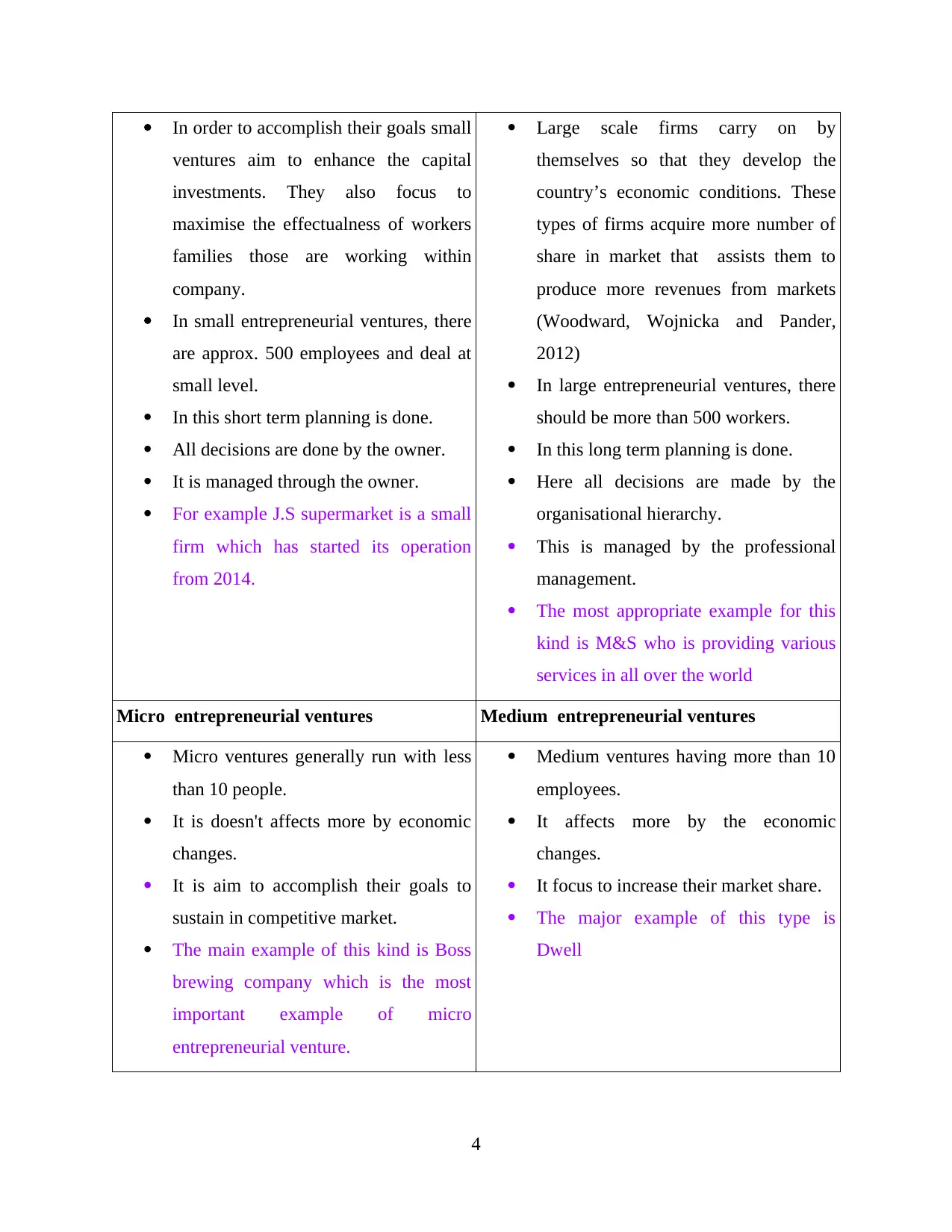
In order to accomplish their goals small
ventures aim to enhance the capital
investments. They also focus to
maximise the effectualness of workers
families those are working within
company.
In small entrepreneurial ventures, there
are approx. 500 employees and deal at
small level.
In this short term planning is done.
All decisions are done by the owner.
It is managed through the owner.
For example J.S supermarket is a small
firm which has started its operation
from 2014.
Large scale firms carry on by
themselves so that they develop the
country’s economic conditions. These
types of firms acquire more number of
share in market that assists them to
produce more revenues from markets
(Woodward, Wojnicka and Pander,
2012)
In large entrepreneurial ventures, there
should be more than 500 workers.
In this long term planning is done.
Here all decisions are made by the
organisational hierarchy.
This is managed by the professional
management.
The most appropriate example for this
kind is M&S who is providing various
services in all over the world
Micro entrepreneurial ventures Medium entrepreneurial ventures
Micro ventures generally run with less
than 10 people.
It is doesn't affects more by economic
changes.
It is aim to accomplish their goals to
sustain in competitive market.
The main example of this kind is Boss
brewing company which is the most
important example of micro
entrepreneurial venture.
Medium ventures having more than 10
employees.
It affects more by the economic
changes.
It focus to increase their market share.
The major example of this type is
Dwell
4
ventures aim to enhance the capital
investments. They also focus to
maximise the effectualness of workers
families those are working within
company.
In small entrepreneurial ventures, there
are approx. 500 employees and deal at
small level.
In this short term planning is done.
All decisions are done by the owner.
It is managed through the owner.
For example J.S supermarket is a small
firm which has started its operation
from 2014.
Large scale firms carry on by
themselves so that they develop the
country’s economic conditions. These
types of firms acquire more number of
share in market that assists them to
produce more revenues from markets
(Woodward, Wojnicka and Pander,
2012)
In large entrepreneurial ventures, there
should be more than 500 workers.
In this long term planning is done.
Here all decisions are made by the
organisational hierarchy.
This is managed by the professional
management.
The most appropriate example for this
kind is M&S who is providing various
services in all over the world
Micro entrepreneurial ventures Medium entrepreneurial ventures
Micro ventures generally run with less
than 10 people.
It is doesn't affects more by economic
changes.
It is aim to accomplish their goals to
sustain in competitive market.
The main example of this kind is Boss
brewing company which is the most
important example of micro
entrepreneurial venture.
Medium ventures having more than 10
employees.
It affects more by the economic
changes.
It focus to increase their market share.
The major example of this type is
Dwell
4
⊘ This is a preview!⊘
Do you want full access?
Subscribe today to unlock all pages.

Trusted by 1+ million students worldwide
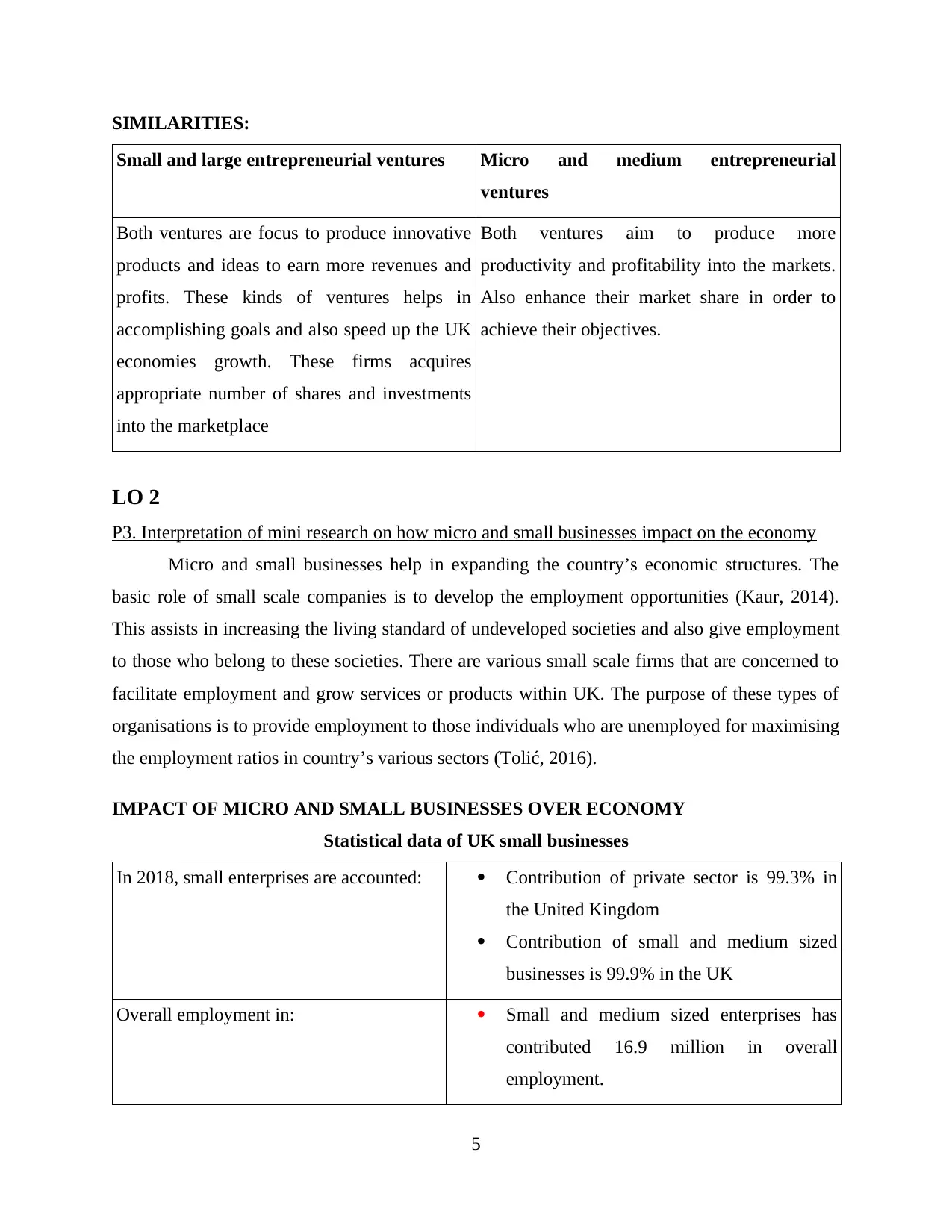
SIMILARITIES:
Small and large entrepreneurial ventures Micro and medium entrepreneurial
ventures
Both ventures are focus to produce innovative
products and ideas to earn more revenues and
profits. These kinds of ventures helps in
accomplishing goals and also speed up the UK
economies growth. These firms acquires
appropriate number of shares and investments
into the marketplace
Both ventures aim to produce more
productivity and profitability into the markets.
Also enhance their market share in order to
achieve their objectives.
LO 2
P3. Interpretation of mini research on how micro and small businesses impact on the economy
Micro and small businesses help in expanding the country’s economic structures. The
basic role of small scale companies is to develop the employment opportunities (Kaur, 2014).
This assists in increasing the living standard of undeveloped societies and also give employment
to those who belong to these societies. There are various small scale firms that are concerned to
facilitate employment and grow services or products within UK. The purpose of these types of
organisations is to provide employment to those individuals who are unemployed for maximising
the employment ratios in country’s various sectors (Tolić, 2016).
IMPACT OF MICRO AND SMALL BUSINESSES OVER ECONOMY
Statistical data of UK small businesses
In 2018, small enterprises are accounted: Contribution of private sector is 99.3% in
the United Kingdom
Contribution of small and medium sized
businesses is 99.9% in the UK
Overall employment in: Small and medium sized enterprises has
contributed 16.9 million in overall
employment.
5
Small and large entrepreneurial ventures Micro and medium entrepreneurial
ventures
Both ventures are focus to produce innovative
products and ideas to earn more revenues and
profits. These kinds of ventures helps in
accomplishing goals and also speed up the UK
economies growth. These firms acquires
appropriate number of shares and investments
into the marketplace
Both ventures aim to produce more
productivity and profitability into the markets.
Also enhance their market share in order to
achieve their objectives.
LO 2
P3. Interpretation of mini research on how micro and small businesses impact on the economy
Micro and small businesses help in expanding the country’s economic structures. The
basic role of small scale companies is to develop the employment opportunities (Kaur, 2014).
This assists in increasing the living standard of undeveloped societies and also give employment
to those who belong to these societies. There are various small scale firms that are concerned to
facilitate employment and grow services or products within UK. The purpose of these types of
organisations is to provide employment to those individuals who are unemployed for maximising
the employment ratios in country’s various sectors (Tolić, 2016).
IMPACT OF MICRO AND SMALL BUSINESSES OVER ECONOMY
Statistical data of UK small businesses
In 2018, small enterprises are accounted: Contribution of private sector is 99.3% in
the United Kingdom
Contribution of small and medium sized
businesses is 99.9% in the UK
Overall employment in: Small and medium sized enterprises has
contributed 16.9 million in overall
employment.
5
Paraphrase This Document
Need a fresh take? Get an instant paraphrase of this document with our AI Paraphraser
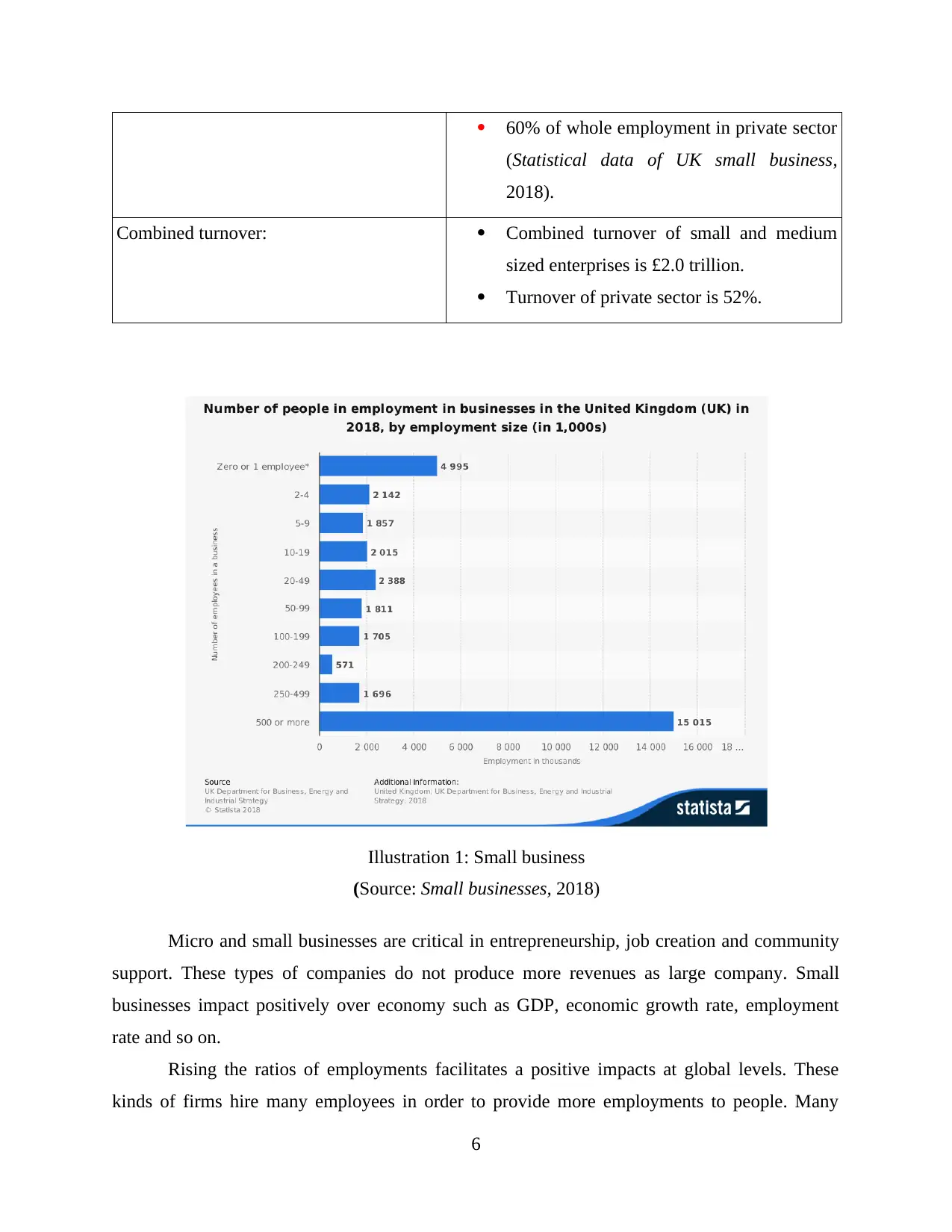
60% of whole employment in private sector
(Statistical data of UK small business,
2018).
Combined turnover: Combined turnover of small and medium
sized enterprises is £2.0 trillion.
Turnover of private sector is 52%.
Illustration 1: Small business
(Source: Small businesses, 2018)
Micro and small businesses are critical in entrepreneurship, job creation and community
support. These types of companies do not produce more revenues as large company. Small
businesses impact positively over economy such as GDP, economic growth rate, employment
rate and so on.
Rising the ratios of employments facilitates a positive impacts at global levels. These
kinds of firms hire many employees in order to provide more employments to people. Many
6
(Statistical data of UK small business,
2018).
Combined turnover: Combined turnover of small and medium
sized enterprises is £2.0 trillion.
Turnover of private sector is 52%.
Illustration 1: Small business
(Source: Small businesses, 2018)
Micro and small businesses are critical in entrepreneurship, job creation and community
support. These types of companies do not produce more revenues as large company. Small
businesses impact positively over economy such as GDP, economic growth rate, employment
rate and so on.
Rising the ratios of employments facilitates a positive impacts at global levels. These
kinds of firms hire many employees in order to provide more employments to people. Many
6
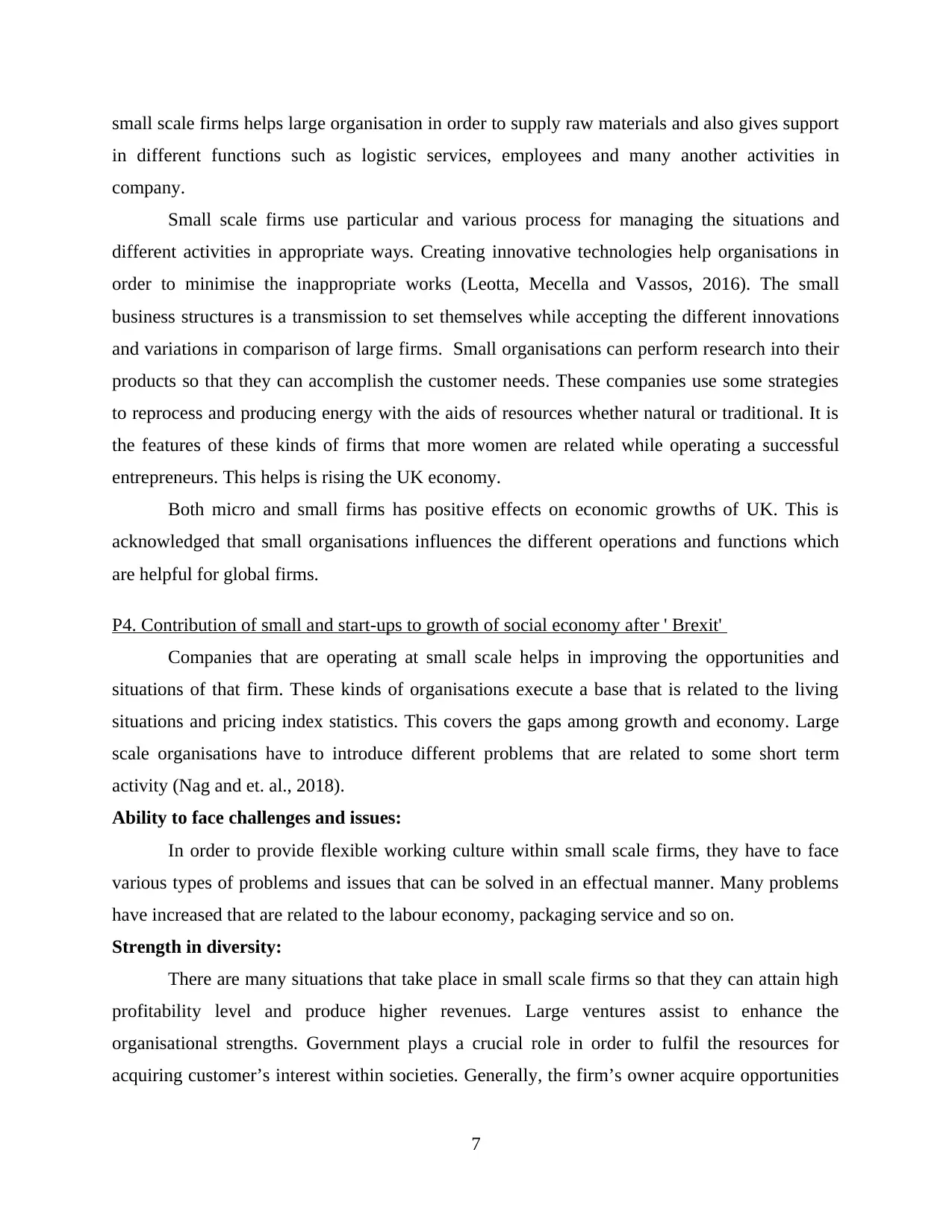
small scale firms helps large organisation in order to supply raw materials and also gives support
in different functions such as logistic services, employees and many another activities in
company.
Small scale firms use particular and various process for managing the situations and
different activities in appropriate ways. Creating innovative technologies help organisations in
order to minimise the inappropriate works (Leotta, Mecella and Vassos, 2016). The small
business structures is a transmission to set themselves while accepting the different innovations
and variations in comparison of large firms. Small organisations can perform research into their
products so that they can accomplish the customer needs. These companies use some strategies
to reprocess and producing energy with the aids of resources whether natural or traditional. It is
the features of these kinds of firms that more women are related while operating a successful
entrepreneurs. This helps is rising the UK economy.
Both micro and small firms has positive effects on economic growths of UK. This is
acknowledged that small organisations influences the different operations and functions which
are helpful for global firms.
P4. Contribution of small and start-ups to growth of social economy after ' Brexit'
Companies that are operating at small scale helps in improving the opportunities and
situations of that firm. These kinds of organisations execute a base that is related to the living
situations and pricing index statistics. This covers the gaps among growth and economy. Large
scale organisations have to introduce different problems that are related to some short term
activity (Nag and et. al., 2018).
Ability to face challenges and issues:
In order to provide flexible working culture within small scale firms, they have to face
various types of problems and issues that can be solved in an effectual manner. Many problems
have increased that are related to the labour economy, packaging service and so on.
Strength in diversity:
There are many situations that take place in small scale firms so that they can attain high
profitability level and produce higher revenues. Large ventures assist to enhance the
organisational strengths. Government plays a crucial role in order to fulfil the resources for
acquiring customer’s interest within societies. Generally, the firm’s owner acquire opportunities
7
in different functions such as logistic services, employees and many another activities in
company.
Small scale firms use particular and various process for managing the situations and
different activities in appropriate ways. Creating innovative technologies help organisations in
order to minimise the inappropriate works (Leotta, Mecella and Vassos, 2016). The small
business structures is a transmission to set themselves while accepting the different innovations
and variations in comparison of large firms. Small organisations can perform research into their
products so that they can accomplish the customer needs. These companies use some strategies
to reprocess and producing energy with the aids of resources whether natural or traditional. It is
the features of these kinds of firms that more women are related while operating a successful
entrepreneurs. This helps is rising the UK economy.
Both micro and small firms has positive effects on economic growths of UK. This is
acknowledged that small organisations influences the different operations and functions which
are helpful for global firms.
P4. Contribution of small and start-ups to growth of social economy after ' Brexit'
Companies that are operating at small scale helps in improving the opportunities and
situations of that firm. These kinds of organisations execute a base that is related to the living
situations and pricing index statistics. This covers the gaps among growth and economy. Large
scale organisations have to introduce different problems that are related to some short term
activity (Nag and et. al., 2018).
Ability to face challenges and issues:
In order to provide flexible working culture within small scale firms, they have to face
various types of problems and issues that can be solved in an effectual manner. Many problems
have increased that are related to the labour economy, packaging service and so on.
Strength in diversity:
There are many situations that take place in small scale firms so that they can attain high
profitability level and produce higher revenues. Large ventures assist to enhance the
organisational strengths. Government plays a crucial role in order to fulfil the resources for
acquiring customer’s interest within societies. Generally, the firm’s owner acquire opportunities
7
⊘ This is a preview!⊘
Do you want full access?
Subscribe today to unlock all pages.

Trusted by 1+ million students worldwide
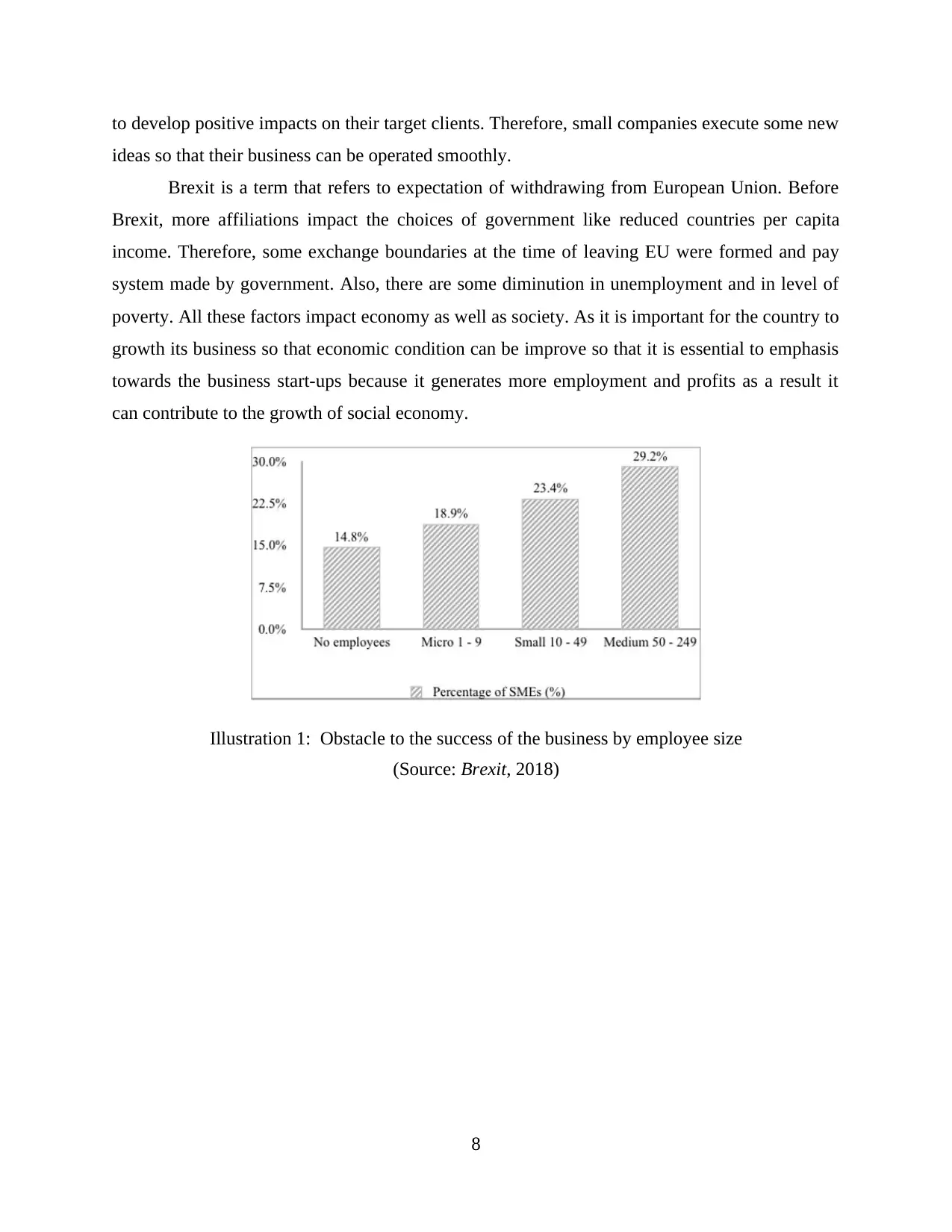
to develop positive impacts on their target clients. Therefore, small companies execute some new
ideas so that their business can be operated smoothly.
Brexit is a term that refers to expectation of withdrawing from European Union. Before
Brexit, more affiliations impact the choices of government like reduced countries per capita
income. Therefore, some exchange boundaries at the time of leaving EU were formed and pay
system made by government. Also, there are some diminution in unemployment and in level of
poverty. All these factors impact economy as well as society. As it is important for the country to
growth its business so that economic condition can be improve so that it is essential to emphasis
towards the business start-ups because it generates more employment and profits as a result it
can contribute to the growth of social economy.
Illustration 1: Obstacle to the success of the business by employee size
(Source: Brexit, 2018)
8
ideas so that their business can be operated smoothly.
Brexit is a term that refers to expectation of withdrawing from European Union. Before
Brexit, more affiliations impact the choices of government like reduced countries per capita
income. Therefore, some exchange boundaries at the time of leaving EU were formed and pay
system made by government. Also, there are some diminution in unemployment and in level of
poverty. All these factors impact economy as well as society. As it is important for the country to
growth its business so that economic condition can be improve so that it is essential to emphasis
towards the business start-ups because it generates more employment and profits as a result it
can contribute to the growth of social economy.
Illustration 1: Obstacle to the success of the business by employee size
(Source: Brexit, 2018)
8
Paraphrase This Document
Need a fresh take? Get an instant paraphrase of this document with our AI Paraphraser
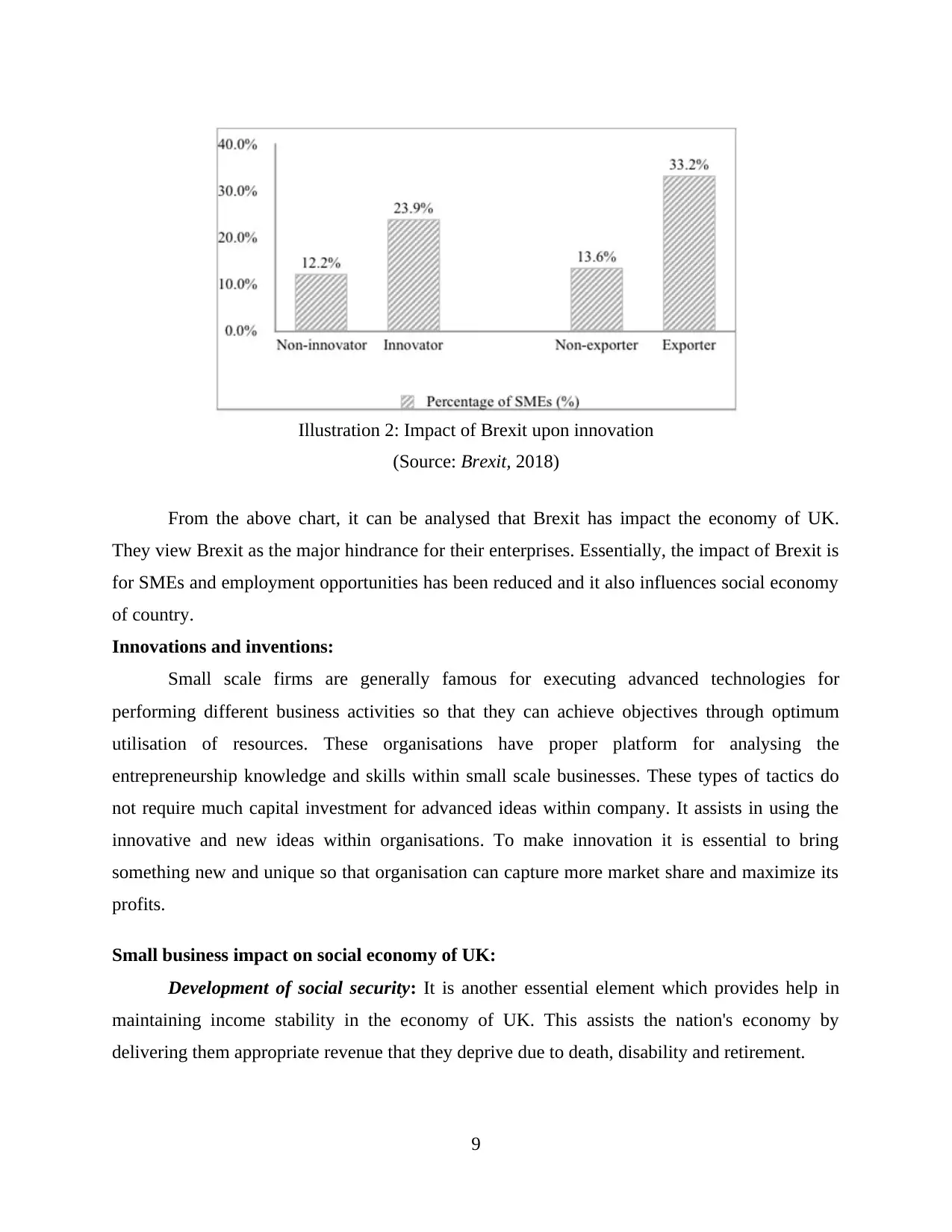
Illustration 2: Impact of Brexit upon innovation
(Source: Brexit, 2018)
From the above chart, it can be analysed that Brexit has impact the economy of UK.
They view Brexit as the major hindrance for their enterprises. Essentially, the impact of Brexit is
for SMEs and employment opportunities has been reduced and it also influences social economy
of country.
Innovations and inventions:
Small scale firms are generally famous for executing advanced technologies for
performing different business activities so that they can achieve objectives through optimum
utilisation of resources. These organisations have proper platform for analysing the
entrepreneurship knowledge and skills within small scale businesses. These types of tactics do
not require much capital investment for advanced ideas within company. It assists in using the
innovative and new ideas within organisations. To make innovation it is essential to bring
something new and unique so that organisation can capture more market share and maximize its
profits.
Small business impact on social economy of UK:
Development of social security: It is another essential element which provides help in
maintaining income stability in the economy of UK. This assists the nation's economy by
delivering them appropriate revenue that they deprive due to death, disability and retirement.
9
(Source: Brexit, 2018)
From the above chart, it can be analysed that Brexit has impact the economy of UK.
They view Brexit as the major hindrance for their enterprises. Essentially, the impact of Brexit is
for SMEs and employment opportunities has been reduced and it also influences social economy
of country.
Innovations and inventions:
Small scale firms are generally famous for executing advanced technologies for
performing different business activities so that they can achieve objectives through optimum
utilisation of resources. These organisations have proper platform for analysing the
entrepreneurship knowledge and skills within small scale businesses. These types of tactics do
not require much capital investment for advanced ideas within company. It assists in using the
innovative and new ideas within organisations. To make innovation it is essential to bring
something new and unique so that organisation can capture more market share and maximize its
profits.
Small business impact on social economy of UK:
Development of social security: It is another essential element which provides help in
maintaining income stability in the economy of UK. This assists the nation's economy by
delivering them appropriate revenue that they deprive due to death, disability and retirement.
9
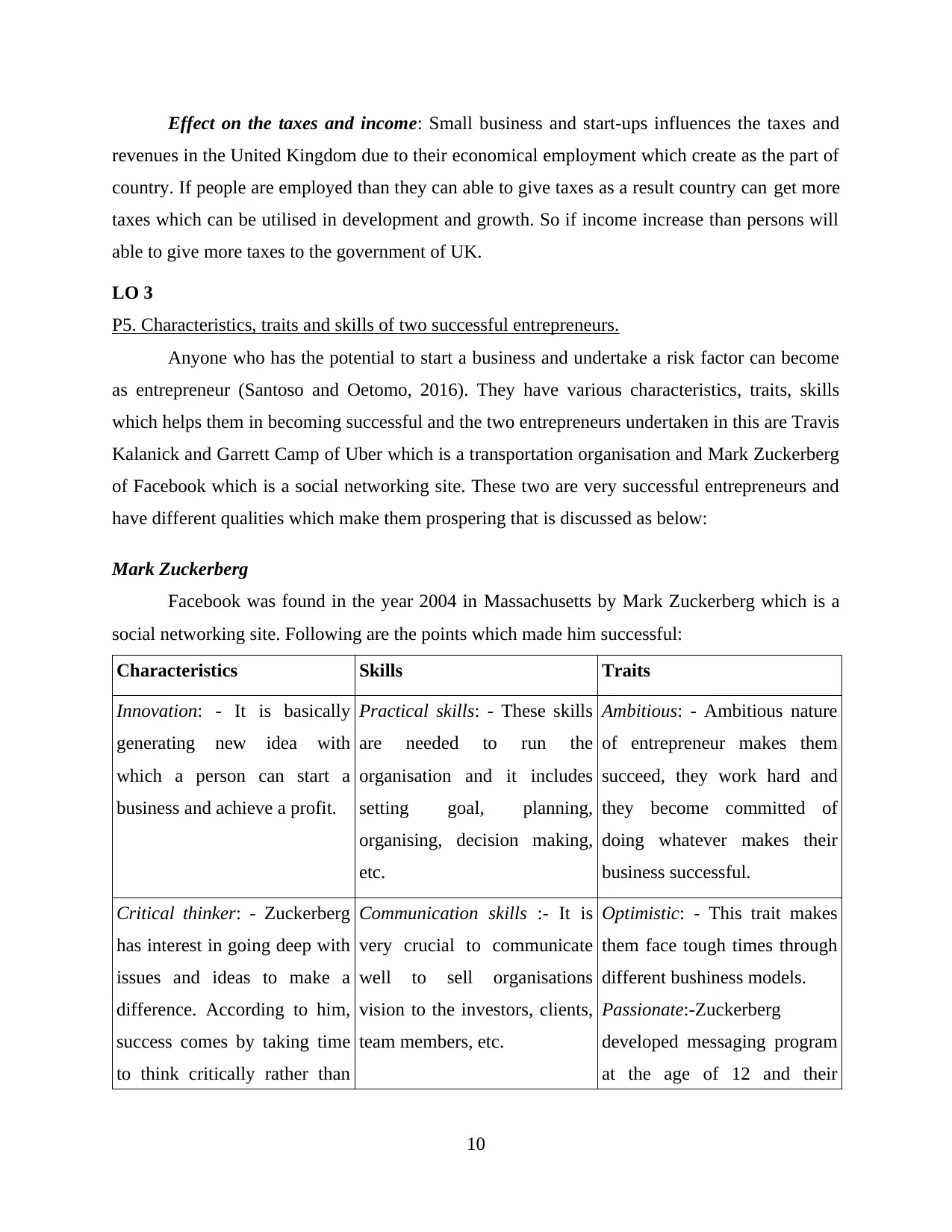
Effect on the taxes and income: Small business and start-ups influences the taxes and
revenues in the United Kingdom due to their economical employment which create as the part of
country. If people are employed than they can able to give taxes as a result country can get more
taxes which can be utilised in development and growth. So if income increase than persons will
able to give more taxes to the government of UK.
LO 3
P5. Characteristics, traits and skills of two successful entrepreneurs.
Anyone who has the potential to start a business and undertake a risk factor can become
as entrepreneur (Santoso and Oetomo, 2016). They have various characteristics, traits, skills
which helps them in becoming successful and the two entrepreneurs undertaken in this are Travis
Kalanick and Garrett Camp of Uber which is a transportation organisation and Mark Zuckerberg
of Facebook which is a social networking site. These two are very successful entrepreneurs and
have different qualities which make them prospering that is discussed as below:
Mark Zuckerberg
Facebook was found in the year 2004 in Massachusetts by Mark Zuckerberg which is a
social networking site. Following are the points which made him successful:
Characteristics Skills Traits
Innovation: - It is basically
generating new idea with
which a person can start a
business and achieve a profit.
Practical skills: - These skills
are needed to run the
organisation and it includes
setting goal, planning,
organising, decision making,
etc.
Ambitious: - Ambitious nature
of entrepreneur makes them
succeed, they work hard and
they become committed of
doing whatever makes their
business successful.
Critical thinker: - Zuckerberg
has interest in going deep with
issues and ideas to make a
difference. According to him,
success comes by taking time
to think critically rather than
Communication skills :- It is
very crucial to communicate
well to sell organisations
vision to the investors, clients,
team members, etc.
Optimistic: - This trait makes
them face tough times through
different bushiness models.
Passionate:-Zuckerberg
developed messaging program
at the age of 12 and their
10
revenues in the United Kingdom due to their economical employment which create as the part of
country. If people are employed than they can able to give taxes as a result country can get more
taxes which can be utilised in development and growth. So if income increase than persons will
able to give more taxes to the government of UK.
LO 3
P5. Characteristics, traits and skills of two successful entrepreneurs.
Anyone who has the potential to start a business and undertake a risk factor can become
as entrepreneur (Santoso and Oetomo, 2016). They have various characteristics, traits, skills
which helps them in becoming successful and the two entrepreneurs undertaken in this are Travis
Kalanick and Garrett Camp of Uber which is a transportation organisation and Mark Zuckerberg
of Facebook which is a social networking site. These two are very successful entrepreneurs and
have different qualities which make them prospering that is discussed as below:
Mark Zuckerberg
Facebook was found in the year 2004 in Massachusetts by Mark Zuckerberg which is a
social networking site. Following are the points which made him successful:
Characteristics Skills Traits
Innovation: - It is basically
generating new idea with
which a person can start a
business and achieve a profit.
Practical skills: - These skills
are needed to run the
organisation and it includes
setting goal, planning,
organising, decision making,
etc.
Ambitious: - Ambitious nature
of entrepreneur makes them
succeed, they work hard and
they become committed of
doing whatever makes their
business successful.
Critical thinker: - Zuckerberg
has interest in going deep with
issues and ideas to make a
difference. According to him,
success comes by taking time
to think critically rather than
Communication skills :- It is
very crucial to communicate
well to sell organisations
vision to the investors, clients,
team members, etc.
Optimistic: - This trait makes
them face tough times through
different bushiness models.
Passionate:-Zuckerberg
developed messaging program
at the age of 12 and their
10
⊘ This is a preview!⊘
Do you want full access?
Subscribe today to unlock all pages.

Trusted by 1+ million students worldwide
1 out of 19
Related Documents
Your All-in-One AI-Powered Toolkit for Academic Success.
+13062052269
info@desklib.com
Available 24*7 on WhatsApp / Email
![[object Object]](/_next/static/media/star-bottom.7253800d.svg)
Unlock your academic potential
Copyright © 2020–2026 A2Z Services. All Rights Reserved. Developed and managed by ZUCOL.





